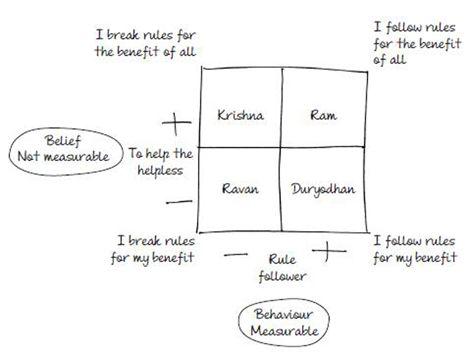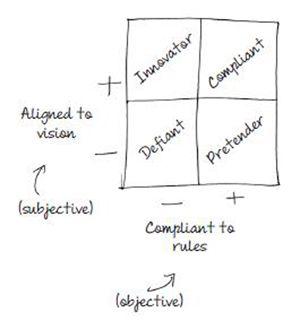Business Sutra: A Very Indian Approach to Management (38 page)
Read Business Sutra: A Very Indian Approach to Management Online
Authors: Devdutt Pattanaik

During the breakout sessions at the international conference of a large cosmetics company, everyone was asked to voice their issues with the new positioning of the old product. Yasmin had many objections arising from the local realities of India. Before she could voice these, her boss, Gajendra, tapped her on the shoulder and said, "This is a charade. They have already printed the brochures and the leaflets and agencies have already filmed the ad-campaign that we have rolled out. So do not bother protesting or being honest. This meeting is just a formality to tell the board of directors that local markets were consulted before the launch. Nobody will believe it but everyone will applaud their efforts. So just smile and tell them how wonderful the new positioning is. That is what they want to hear. And if you tell them what they want to hear, they will reward you by calling you to the next international conference." With this dialogue, Gajendra encouraged Yasmin to become a Duryodhan and work with the system, her personal views notwithstanding.

We want to live by our own rules
Ravan is the most charismatic and enchanting villain of Hindu mythology. With ten heads, twenty arms, a flying chariot and a city of gold in the middle of the sea, he stands out in the epic Ramayan. He drives his brother Kuber out of the city of Lanka and declares himself king. When Ram and his brother humiliate his sister, Surpanaka, he decides to teach them a lesson by abducting Ram's wife, Sita. Ravan is much admired as he lives by his own rules. What is overlooked is that he is the dominant alpha male, who does not care for anyone except those who please him. He kicks his brother Vibhishan out of the house because he refuses to align with him. He wakes up his other brother, Kumbhakarn, even though it has been foretold that if he is disturbed before it is his time to wake up he will meet certain death. He lets his city Lanka burn and his sons and brothers die, but refuses to give Sita up.
In the Mahabharat, the Pandav Bhim also displays this trait of living by his own rules. He is in the habit of walking straight towards his destination, refusing to take any turn, destroying everything that stands in his path. Fearing Bhim's might, rocks, trees and animals make way for him. Once, while on his way to fetch a flower for his beloved wife, Bhim finds an old monkey lying across his path. Too proud to go around this old creature, Bhim introduces himself and insists that the monkey make way for him. The old monkey tells Bhim, "I cannot move, I am too weak. Just kick my tail aside and go forth," Bhim tries to do that, but fails. The tail is just too heavy! The monkey reveals he is Hanuman, representing nature that refuses to submit to the excesses of man.

We admire people who do things their way, who stand up to governments, change policies and make their mark in industry and society. These defiant heroes represent raw power that shapes the world around them by grit and determination. Upon closer observation, we realize they use rules to dominate and control the world around them. Their rules only serve them.
Prakash wants to be an entrepreneur. Not because he has any great idea or a great service to offer, he simply wants to be his own boss. He is tired of obeying others, submitting to the whims and fancies of his superiors who he feels are much less talented than him. He refuses to be a cog in the wheel; he wants to be the owner of the wheel. He wants to be an alpha. He wants everyone to listen to him and live life on his own terms.
Innovation is not possible unless rules are broken
As a child, Krishna defies rules when he steals the butter of milkmaids as well as their hearts earning the titles of makhan-chor and chit-chor. Yet, he is forgiven, for his actions bring joy and compel people to be more generous with their resources and affection.
As a grown man, Krishna defies rules several times in the battlefield. He does it when he get the patriarch Bhisma to lower his bow, by getting the androgynous Shikhandi to ride on his chariot in front of Arjun. To get Drona to lower his weapons, Krishna spreads the rumour that Drona's son, Ashwatthama, is dead. He is referring to an elephant, but he knows Drona will assume it is his son and lower his weapons, giving Dhristadhyumna the chance to behead the old teacher. Krishna goads Arjun to strike Karna even though Karna is unarmed, helpless and busy trying to release the wheel of his chariot from the ground. He goads Bhim to strike Duryodhan with a fatal blow below the navel on his thigh, which is expressly forbidden by the rules of war.
Krishna can be described as an innovator, one who creates better rules by breaking and bending old rules that do not serve their purpose. But he does so gently, with a smile, taking people into confidence. The shift is subtle, taking one by surprise. And the change is aimed to create a society where jungle laws do not exist.
Every person is an innovator, a pretender—compliant and defiant in different contexts. Every team has someone who is such a person. This is the world of sanskriti, where all is not as it seems. It lacks the transparency of nature. As long as there is imagination, such transparency of feelings will not exist.

Mohit took a huge risk. Breaking all company policies, he told his team to talk to the client directly rather go through official intermediaries. This led to a huge furore and Mohit was summoned to the CEO's office. The client-facing team was there with proof of Mohit's audacity. Mohit did not deny the charges. He simply presented a slide show that proved the difference in turnaround time in the six months before he broke and after he broke the rule. The turnaround time had shortened and the number of customer complaints had dramatically gone down. Bypassing the client-serving team, the delivery team had reduced affairs getting lost in translation thereby improving the equity of the firm. The client trusted the firm more. Mohit was a Krishna breaking the rules not out of spite or indifference, but because they were doing more harm than good. The CEO agreed and Mohit was allowed to continue his initiative.
We respect those who uphold rules
Ram is maryada purushottam, supreme upholder of laws that make up the social order. He is the only form of Vishnu to be worshipped as king. He upholds rules even at the cost of personal happiness.
The rules state that the king shall always keep his word. When Dashrath tells Ram about Kaikeyi's demands, Ram leaves for exile immediately without a word of protest. This is not the act of an obedient son; this is an act of a law-abiding prince who upholds rules to ensure the integrity of the royal family.
The rules state that a man shall always be faithful to his wife. Ram never looks at another woman or remarries when separated from Sita. This, too, is an act of upholding the law rather than an act borne out of love. Ram does not make rules—he follows them. He is supremely compliant. And the kingdom he fosters is described as a world where nothing is unpredictable and everything is organized.
When the branch office is established in Ahmedabad, Sunil is clear he wants Alok as the branch head. Alok is straightforward and trustworthy. He will follow the rules meticulously and ensure all processes are implemented and followed. He will create a culture of compliance. As the branch office is primarily a delivery centre and not a client-facing arm, Sunil is looking for a Ram to create a predictable and controllable environment. Alok is perfect for the job.

Rules need not determine our value
Sita goes into forest exile twice in the Ramayan. The first time, it is voluntary; she follows Ram as a dutiful wife. The second time, it is involuntary; she is abandoned in the forest on Ram's instruction following street gossip about her reputation. Ram does not see Sita. His gaze is only on the rules.
Despite this Sita never begrudges Ram. Though abandoned and alone in the forest, she knows that his role as a king compels him to take this drastic step. She knows where he is coming from, his commitment to the rules, his obligation as scion of a royal clan and his responsibility to his people. While she knows the consequences of his decisions, she also knows that he will always be true to her. When her sons are old enough, she sends them to their father. Ram asks her to come back, but she refuses. As a resident of the forest, she is no longer bound by the rules of the city. In the forest she is not obliged to obey. She asks the earth-goddess, her mother, to take her back. The earth opens up and takes her in.
Sita no longer needs the Durga offered by social rules. She has enough Shakti within her to live without them. She does not need a social body; she does not need to be wife or queen. Her mental body no longer seeks external validation.
Prathamesh was accused of sexual misconduct and asked to leave the firm as long as the inquiry was pending. Keeping him around would affect the image of the company negatively. It would speak volumes about the company's moral stand in such matters. Prathamesh was furious. He knew that it was impossible to prove what actually transpired behind closed doors. It was his word against the lady who had accused him. His conscience was clear but he kept reliving the day in his mind: had he said, or done something that could have been misunderstood? Three months later, Prathamesh was asked to rejoin the firm. There was insufficient evidence against him. It was a case of cultural misunderstanding. Prathamesh declined the offer. He had learned that there was life beyond the wealth and privilege offered by the firm.
Stability
Nature is changing. Markets are changing. Human needs are changing. New tools and technologies are appearing and old ones disappearing. Some seek stability, certainty and predictability: the status quo. Others seek change, revolution, and transformation: a change in their status. With stability comes peace, monotony and stagnation. With change comes stress, excitement and growth.
When the world changes, our social body dies